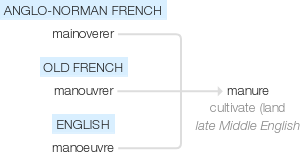Manure
late Middle English (as a verb in the sense ‘cultivate (land’)): from Anglo-Norman French mainoverer, Old French manouvrer (see manoeuvre). The noun sense dates from the mid 16th century.
wiktionary
From Middle English maynouren, manuren(“to supervise, toil”), borrowed from Anglo-Norman meinourer and Old French manovrer (whence also English maneuver), from Vulgar Latin*manuoperare(“work by hand”), from Latin manū(“by hand”) + operārī(“to work”).
etymonline
manure (v.)
c. 1400, "to cultivate (land, a garden) by manual labor," also "to hold property, rule," from Anglo-French meynoverer (late 13c.), Old French manovrer "to work with the hands, cultivate; carry out; make, produce," from Medieval Latin manuoperare (see maneuver (n.))
Sense of "work the earth" led to "put dung and compost on the soil, treat (soil) with fertilizing materials" (1590s) and to the noun meaning "dung spread as fertilizer," which is first attested 1540s. Until late 18c., however, the verb still was used in a figurative sense of "to cultivate the mind, train the mental powers."
It is ... his own painfull study ... that manures and improves his ministeriall gifts. [Milton, 1641]
Related: Manured; manuring. Another Middle English word for "manuring" was donginge.
manure (n.)
"dung or compost used as fertilizer, any substance (especially the excrement of livestock) added to the soil to render it more fertile," 1540s, from manure (v.).
